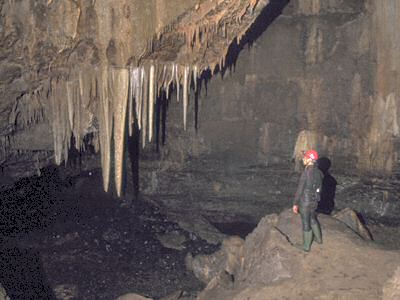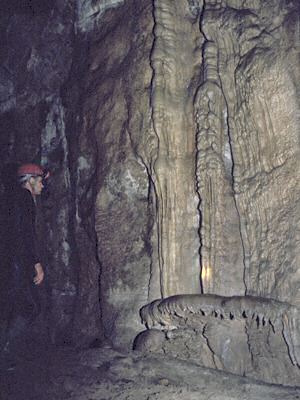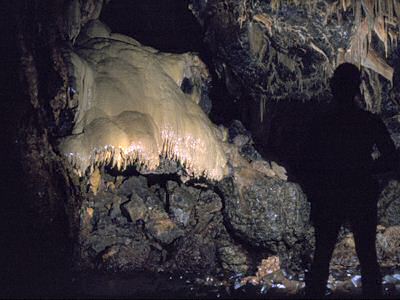Earth Science Conservation Review
| Marble Arch Karst; Pollnagollum | Fermanagh |
| Site Type: | Cave, Doline |
| Site Status: | ASSI |
| Council area: | Fermanagh District Council |
| Grid Reference: | H12783386 |
| Google maps: | 54.25338,-7.80513 |
| Rocks | |
|---|---|
| Rock Age: | Quaternary (Holocene) |
| Rock Type: | Breccia, Limestone |
| Interest | |
| Minerals: | Calcite, Dolomite |
| Other interest: | fault, cave, clastic sediments, doline, flowstone, speleothem, stalactite |
Summary of site:
Pollnagollum of the Boats is a large collapse crater (doline), 14m deep above the cave of the same name, and gives access at depth to the active underground course of the Owenbrean River. At the back of the doline beneath an overhang, a prominent fault can be seen which is reflected in the landscape to the south by a north-south-trending dry valley and in the cave itself by the direction of the main passage and the river.
The doline is filled with massive boulders. A 7m descent through this choke gives access to a large upper chamber floored by unstable boulders subsiding into the active stream level below. Instability of the roof of this main chamber led to a collapse forming Pollthanacarra, an open vertical shaft some 30m to the south of the doline. It was in the mound of limestone debris formed by this collapse, now closed with the roof of the main chamber, that a team of geologists from the Ulster Museum found extensive mammalian remains in 1972. The faunal list includes early Irish cattle, sheep or goat, red deer, boar, hare, wolf and field mouse, as well as human remains, all with radiocarbon dates between 4,500 and 3,500 years before the present day. Pollthanacarra was interpreted as a pit fall, deep enough to kill the animals that fell in. There is a possibility that the human remains (Neolithic or Bronze Age) were thrown in.
A further tight descent through the boulder floor of the main chamber leads to a fine stream gallery extending upstream for 640m, with exceptional stalactites, stalagmites and flowstone features. The gallery passes under Polldownlong, another doline, and almost reaches Pollasumera where the Owenbrean enters the system. The waters of the river have been proved by dye testing to enter the Marble Arch Caves system but there is no direct link through from Pollnagollum.
There is considerable interest in this part of the Marble Arch system with scope for much future research.
The doline is filled with massive boulders. A 7m descent through this choke gives access to a large upper chamber floored by unstable boulders subsiding into the active stream level below. Instability of the roof of this main chamber led to a collapse forming Pollthanacarra, an open vertical shaft some 30m to the south of the doline. It was in the mound of limestone debris formed by this collapse, now closed with the roof of the main chamber, that a team of geologists from the Ulster Museum found extensive mammalian remains in 1972. The faunal list includes early Irish cattle, sheep or goat, red deer, boar, hare, wolf and field mouse, as well as human remains, all with radiocarbon dates between 4,500 and 3,500 years before the present day. Pollthanacarra was interpreted as a pit fall, deep enough to kill the animals that fell in. There is a possibility that the human remains (Neolithic or Bronze Age) were thrown in.
A further tight descent through the boulder floor of the main chamber leads to a fine stream gallery extending upstream for 640m, with exceptional stalactites, stalagmites and flowstone features. The gallery passes under Polldownlong, another doline, and almost reaches Pollasumera where the Owenbrean enters the system. The waters of the river have been proved by dye testing to enter the Marble Arch Caves system but there is no direct link through from Pollnagollum.
There is considerable interest in this part of the Marble Arch system with scope for much future research.
| Enlander, I., Dempster, M. & Doughty, P., 2025. Marble Arch Karst; Pollnagollum, County Fermanagh, site summary. [In] Earth Science Conservation Review. https://www.habitas.org.uk/escr/summary.php?item=349. Accessed on 2025-04-03 |
| Previous Site | Next Site |



